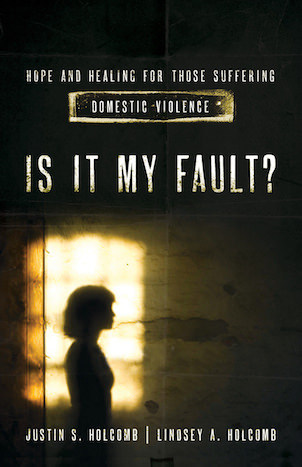
 Justin and Lindsey Holcomb have done it again. As with their earlier work on sexual assault, Rid of My Disgrace, their most recent book Is It My Fault?: Hope and Healing for Those Suffering Domestic Violence, goes where most Christian authors can’t or won’t go. Justin and Lindsey have the unique pastoral ability–and the theology to back it–to shine a light in the darkest of human experiences: abuse from the hands of another human. Truly, the Holcombs are lights in the darkness.
Justin and Lindsey Holcomb have done it again. As with their earlier work on sexual assault, Rid of My Disgrace, their most recent book Is It My Fault?: Hope and Healing for Those Suffering Domestic Violence, goes where most Christian authors can’t or won’t go. Justin and Lindsey have the unique pastoral ability–and the theology to back it–to shine a light in the darkest of human experiences: abuse from the hands of another human. Truly, the Holcombs are lights in the darkness.
The book is broken into three sections, four if you count the substantial appendices. The Holcomb’s first move is to identify what domestic violence is (Part 1: What is Domestic Violence?). As true Law/Gospel theologians, the Holcombs call a thing what it is. Identification of the problem is the key to any solution; unless you know what is happening, you cannot even begin to seek help.
Even though they aim to bring a bright light into a very dark room, they do so with the utmost care and caution. Their pastoral response isn’t to barge in with a spotlight, potentially blinding the victim, or causing her to run farther away; rather, they ease in. They carefully locate the victim, move toward her, hold her hand, light a candle, and then flip on the light switch. The first section moves from the impersonal to the very personal, bringing the reader/victim from looking around at her situation to looking at herself; the whole time creating a safe place for the reader/victim to be able to call a thing what it is by reinforcing that, well, it truly is not their fault that the abuse is happening. Every portion of the first section reinforces this “not your fault” and pours on—in large and lovely doses—the fact that God does love them apart from what other have been saying or doing to them. And it’s here, theologically speaking, where confession is grown: in the safe place of being loved by God—unconditionally.
The second section (Part 2: Women, Domestic Violence, and the Bible) came as a bit of a surprise to me—but a very good surprise. Let me be clear, it is not surprising that the Holcombs would address the topics of women, the Bible, and the church in a book about domestic violence. In fact, they would have been remiss not to have done so. What came as a surprise to me—as a person who actively tries to avoid reading anything remotely associated with the topic of women and the bible—was that I wholeheartedly agreed with what they put forward in this section.
They start out by describing in good and understandable terms the relevance and applicability of God’s grace to the victim—a person who would naturally doubt that there is a loving God disposed toward her, someone who may think she is somehow deserving of the violence wrought on her. From there they progress boldly to discuss women and the Bible and the church. Pulling examples from the Old Testament and the New Testament (relying on Jesus’ interaction with women and Paul’s letters), they demonstrate the Bible’s affirmation of women as equal partners to men (albeit not interchangeable) and correct errant views the victim probably has about herself as a woman and what has been told to her because she’s a woman—she does not deserve the abuse.
Needless to say, it is a great tragedy and a radical aspect of the Fall when a man abuses a woman (or any human is abused for that matter), but that tragedy is multiplied when the one institution put on the earth to bring grace to the wounded fails to do so because it’s wedded to patriarchal principles.When an abused woman cannot flee to the church (a supposed bastion of protection for the oppressed) for help, the church needs to take a long, hard look at itself in the mirror and evaluate its presuppositions, principles, and proclamation.
The Holcombs make it very clear: God not only cares for and loves those who are suffering from abuse, He has actively done something about it. God’s righteousness is inherent in His character, and it’s in His character to care for those who are afflicted in pain and even pain unto death. As He heard the cry of His people in Egypt, He does hear the cry of His people now. “For God so loved the world,that he gave his only Son, that whoever believes in him should not perish but have eternal life” (John 3:16). God has revealed Himself, once and for all, as a God who knows, in the event of the Cross. Because of what Christ has done for us—through his life, death, resurrection, and ascension—we stand pregnant with the fulfillment of the promise that even in our darkest moments, in our despair, in our loneliness, in our abandonment, and in our forsakenness, Jesus—who was no stranger to abandonment and forsakenness (“my God my God…”)—has endured all of those things (and more) so that we would have the assurance and reassurance that He knows. He has physically, actually, been there; moreover, He has done something about it.

That God has acted is the theme of the the third section of the book (Part 3: Reflection on the Psalms). The Holcombs walk the reader/victim through a few chosen psalms that highlight God’s ability to rescue and to save, that highlight God’s love for his people and the pain He feels when they are persecuted (abused). The Holcombs draw the reader/victim into the biblical story: under their care we see that it is not just David praying and calling out to God, his words become the victim’s words. Meaning, David’s psalms give a voice to the voiceless, speechless victim—the woman who is too scared to cry out, too doubtful to hope, too wounded to trust, now has in her hands an inkling of hope and a glimmer of something to trust in.
As I began, so I’ll end: the Holcombs have really done it again. Like their book addressing sexual assault, this book should be read by all—from pastors to lay people—and kept by the box full, ready to be handed out in the moment. This book is a beacon of light, a resource of encouragement and help for those who suffer from domestic violence; and a resounding it is NOT your fault that the victim so desperately needs to hear.

COMMENTS
Leave a Reply












